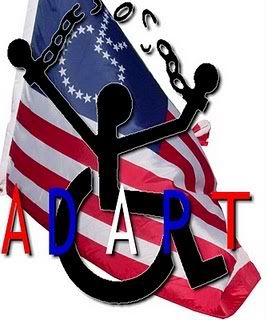Today I did a guest lecture in class. Identity Development & Disability. It wasn't my favorite presentation, in fact after my Disability and the Family presentation of 4mos ago (the last one I did) which was fantastical, I'm a bit disappointed. But whatever. True to all the presentations I've ever given to adults, I got a thank you from someone after class. That's all that matters. I got someone to think. In fact, my professor, a developmental psychologist, told me that while I was talking she kept thinking of ideas for research. Please do them.
I'm off on a tangent. Sometimes I ask this when I talk, but not in the same way really as I did today. As a starting point, "What is the first thing you noticed about me?" Mind you this is the 5th week of class. Only one person answered.
"You contribute a lot in class."
That was it. From the looks on people's faces, he'd sumed it up. The professor said unless someone saw me get out of my chair (kept in the hall during class), if they just saw me sitting there in a desk, they wouldn't know?
WHAT?!?!?! What about my waddle. What about my mild speech issues? HUH?!?!?! Not what I was expecting at all. A friend called me and reamed me out after this post, not understanding why I wouldn't choose to get rid of my CP. She'd get rid of it in a heartbeat. It's the first thing people notice when they see you and she HATES it. Apparently not.
Come to the issue of people rushing to open doors for me and/or in my oppinion, opening them for themselves and then keeping them open longer then socially normal because here I come along. I bring this up A LOT. It's a hot button issue for me. Time and time again I get people (including this professor) who assert that they don't just do that for me. They're just nice people. And they sound completely genuine about it.
The whole experiance was actually very unsettling for me. I've only recently been doing peer presentations. In high school we purposly didn't do them. The coordinator of the program I was in thought it would make people too uncomfortable. Freshman year I think I did 4 or so to undergrad/grad special ed majors. But that was different. That was more of a business talk. So I've done a lot with kids and a fair amount with professionals, but really I've only done peers for the last 2 semesters. It's certainly been different. I'm confused though because I started this after a guy was doing a talk and people said they think of PWDs as people in wheelchairs, the elderly, or little children. Except when I talk, I'm not getting that.
Little kids still stare at me all the time, but teens/peers/"real" adults do not. Why? Why aren't I different? Why aren't I a freak anymore? Truth be told, I'd rather be a freak. I've grown up a freak and an outcast. It's what I know.
So maybe it's all in our heads. Maybe what we experiance now in our lives is a projection of residual feelings from growing up so different. Maybe I'm still so awkward now because I assume too much how people will react to me. Maybe I'm not giving people a fair shot. Or maybe I created a self fufiling prophicy. I don't know.
I'm not saying that ableism isn't alive and well, what I'm proposing is that since we are now mature "adults" we know better, and us AB gen Yers just no longer see the big deal. I hope I'm right. How cool would that be? I googled Gen Y. Some sites put us as a very narrow segment, but I found a somewhat consensus of people born between 1977 and 1989-97 (so let's say 93). We Gen Yers are 31-15.
To compare ableism to racism again, I hope most people would agree that Gen Yers are predominately not raceist. Of course some people will always be raceist, but we didn't grow up in a racially segregated world. Accepting peers of a different race is second nature. At least to me.
IDEA was passed in 1975 2 years before any Gen Yers were born. I hope we all started school mainstreamed/included, or at the very least, when appropriate, in a segregated classroom within a predominately regular education school. While I know services needed to be fought for us to be there, we were still there. We had just as much right as any AB kid to be there.
At 23, I'm smack dab in the middle of Gen Y. The ADA was passed when I was 5. I don't remember life without it. I can get into a movie theatre, or a mall, without it being an issue. Not all places are accessible, there are places down the street from me in older buildings that still have steps outside, but my point is, even though things still aren't perfect, I generally feel perfectly welcome to go about my merry way within society.
Maybe that's because my disability isn't severe. Maybe I'm in quite a good mood today and I'm idealizing society. Maybe if I came back to this severly depressed I'd think I wrote this on crack. I don't know...
We weren't hidden in someones back room or thrown away to institutions. Gen Yers didn't grow up in an abley segregated society. So maybe, like in the case of race, AB Gen Yers just don't know any different. Maybe it's second nature. I can hope.
Yes, as kids AB Gen Yers could be pretty cruel. Kids are still cruel to kids now. Kids are cruel to the disabled kid, the fat kid, the kid with bad acne, the poor kid without a lot of clothes, the socially awkward kid--AB or otherwise, for that matter, a popular kid who shows up at school with a bad haircut. Kids also stare at me, yes. But kids are equal opportunity bulliers. Anyone is fair game. Kids just have this thing with different. Maybe it's developmental? Am I saying that excuses such behavior? No. Kids need to be taught that it's just plain wrong to do such things.
But maybe people have done a good job at that. Like people like me. I used to talk to 3rd graders about my disability. Adults don't generally make fun of people who got a bad haircut (or so again I hope). So maybe when they reach a level of maturity where their brains develop enough to realize that staring and taunting is wrong and start accepting the guy with a bad haircut, they also accept all us gimps. I hope.
Or maybe I just hang around a university with intellectual people of a similar socioeconomic status. Maybe it's just that select segment of the population. Maybe things are different in other geographical regions or in areas with different level of education and socioeconomic status.
I hope not. Cause then as we begin to take over the county I'll start to really believe that I'm no longer an outcast.
It's Beginning to Look A Lot Like Fun*Run Time
It's ALREADY that time of year again: The ADAPT Fun*Run for Disability Rights is April 22nd 2012. Maryland's fundraising goal is $8,000 this year. Yes, that's right, $8,000
Donate $1! Donate $10! Donate $100! Donate $1,000! JUST DONATE so we can FREE OUR PEOPLE! http://adaptfunrun.org/runner.php?id=7 I thank you very much for your support!
Tuesday, July 1, 2008
To Gen Yers (20-Somethings): Is it all in Our Heads Now?
Tags:
Ableism,
accessible society,
ADA,
awareness speaking,
AWESOMNESS,
bullying,
class,
college,
Disability,
Generation Y,
IDEA,
inclusion,
kids,
racism,
school,
staring,
summer school
Subscribe to:
Post Comments (Atom)

















0 comments:
Post a Comment